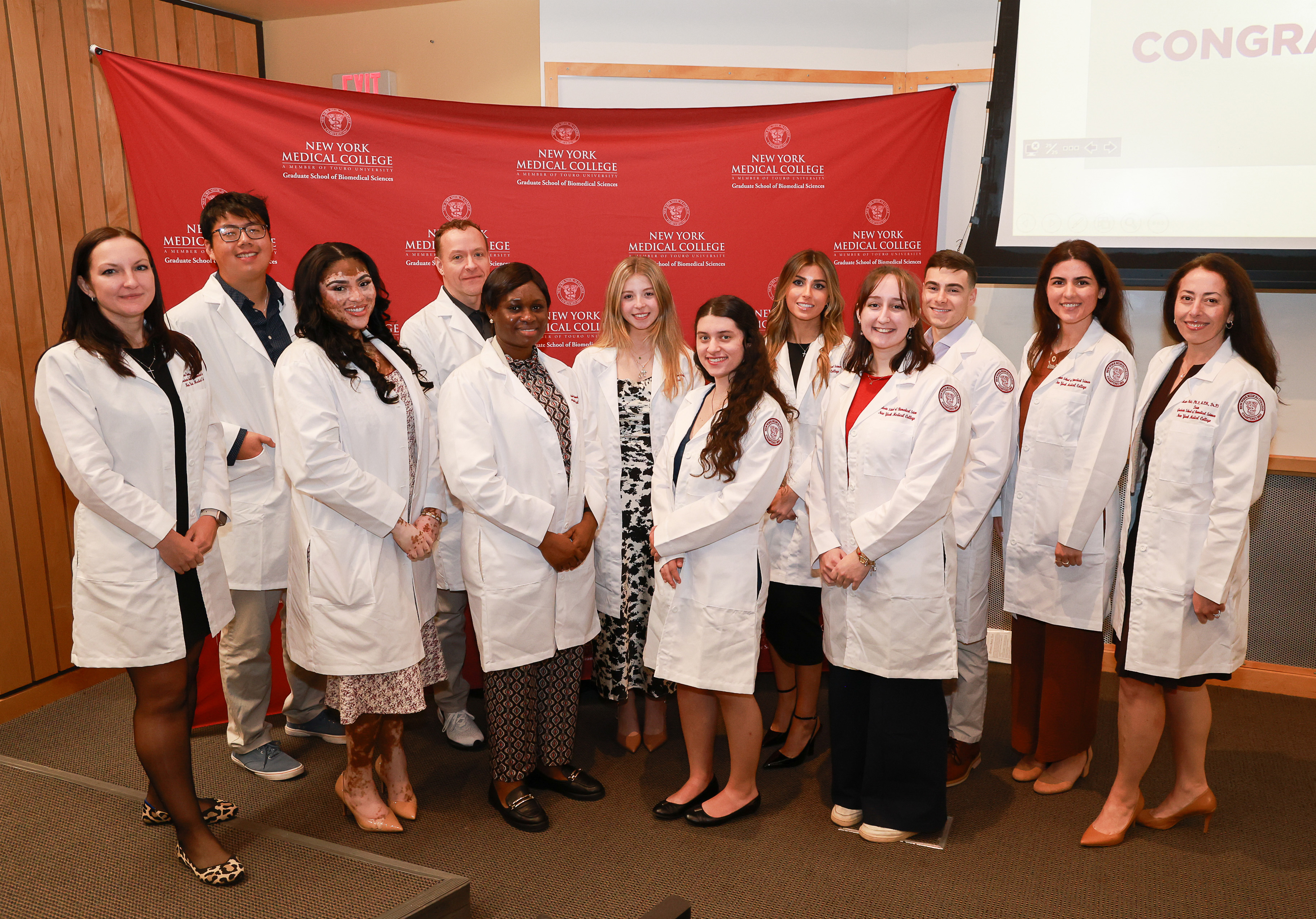Ph.D. Lab Coat Ceremony Marks a Milestone in Biomedical Discovery
Doctoral Students in the GSBMS Don Their Lab Coats, Embrace Curiosity, and Commit to a Lifetime of Scientific Excellence

The auditorium buzzed with pride and anticipation as students from the Graduate School of Biomedical Sciences (GSBMS) stepped into a defining moment of their academic journey. In front of families, faculty, and friends, Ph.D. candidates and new M.D.-Ph.D. students were presented with their white lab coats, each one symbolizing dedication to the field of biomedical sciences and the discoveries yet to come. Smiles and applause filled the room, marking the ceremony as both a milestone and a celebration of the community that supports these future scientists.
Janice Fung, a Ph.D. candidate in pathology, microbiology and immunology, served as the master of ceremonies, welcoming attendees and setting the stage for the celebration. Marina K. Holz, Ph.D., M.P.H. ’23, Dr.P.H. ’24, right, dean of the GSBMS, special assistant to the chancellor, and professor of cell biology and anatomy, greeted the students with warmth and encouragement, weaving history into the moment they were about to experience. She spoke about how white lab coats first appeared in the 1800s, worn by scientists to protect themselves in the lab and to make chemical stains visible. Over time, the coat came to symbolize something greater—medical progress, professionalism, and a commitment to evidence-based discovery. While many physicians today choose attire that makes them more approachable to patients, Dr. Holz reminded the audience that for scientists, the white lab coat remains both a shield and a symbol: essential protective gear and a visible marker of their role in advancing knowledge.
“For our Ph.D. students, what I hope today represents is that by wearing the lab coats together with your Ph.D. advisors, you will form that lifelong bond that will be forged between you and will exist between you throughout the duration of your professional careers,” said Dr. Holz. “Your Ph.D. advisor is much more than the person who directs your dissertation research. This person should become your professional friend and colleague, and someone who will support your professional development long after you leave.”
The presentation of lab coats was introduced by Tetyana Cheairs, M.D., M.S.P.H., left, associate dean for Ph.D. programs and assistant professor of pathology, microbiology and immunology, alongside faculty who welcomed students from the 2023, 2024, and 2025 cohorts. One by one, each Ph.D. candidate walked to the front of the auditorium, where their mentors helped them slip into their lab coats.
After the students donned their white coats, Morgan Anderson-Crannage, a Ph.D. candidate in cell biology, stepped up to deliver the student address. In his remarks, he encouraged his peers to embrace both the triumphs and the challenges of scientific discovery. He reminded them that being wrong is not a failure, but a vital part of the process—a humbling lesson that drives science forward.
“Curiosity isn’t a luxury; it’s a driving force. Too often, curiosity gets diminished, dismissed as childish or frivolous, but it’s anything but,” he said, explaining how curiosity leads to discovery but can get lost in adulthood when there is an increase in responsibility. “But here’s the beauty of science. Curiosity isn’t a side hobby… You hold onto that childlike curiosity; you’ll never lose enjoyment of your work.”
Following his address, Anderson-Crannage invited his fellow Ph.D. candidates to join him in reciting the Graduate Student Code, a pledge underscoring their dedication to integrity and discovery. Afterwards, Raj K. Tiwari, Ph.D., professor of pathology, microbiology and immunology and associate professor of otolaryngology, introduced the keynote speaker Paul Arnaboldi, Ph.D., M.S., associate professor of pathology, microbiology, and immunology. Dr. Arnaboldi shared stories from his own career, speaking candidly about the challenges he faced and the lessons he learned along the way.
He spoke honestly about the demanding life of a scientist—the long weekends in the lab and the late nights spent reading papers while the rest of the world slept. Yet, he reminded students, “If you truly love the discovery aspect, if you truly love doing this, and you put in the effort, you will succeed, and it will be worthwhile.”

